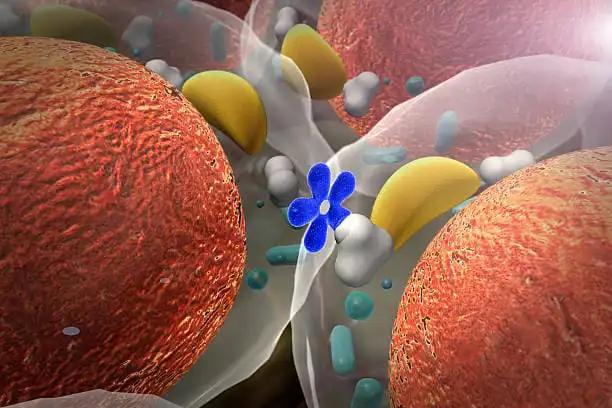KEY TAKEAWAYS
- The phase IIB RCT-EPA study aimed to assess the impact of a MAG-EPA supplement on prostate cancer patients.
- The study showed that lowering gut butyrate, an immune modulator, potentially contributed to MAG-EPA’s positive impact on prostate cancer aggressiveness. Further studies are required for comprehensive understanding and clinical applications.
Elevated eicosapentaenoic fatty acid (EPA) levels in the prostate demonstrate a substantial decrease in the risk of prostate cancer progression to grade group (GG) ≥2 among individuals initially diagnosed with GG1 prostate cancer undergoing active surveillance.
For the phase IIb randomized placebo-controlled study, researchers investigated 130 men with prostate cancer for the impact of a monoacylglyceride-EPA (MAG-EPA) supplement on the aggressiveness of prostate cancer in the pre-prostatectomy phase.
The men with GG ≥2 prostate cancer who underwent radical prostatectomy from 2015 to 2017 received either 3g/day of MAG-EPA (n=65) or placebo (n=65) for seven weeks pre-prostatectomy and up to one-year post-surgery, participated in the study.
The primary outcome measured the cancer proliferation index through automated image analysis of tumor nuclear Ki-67 expression on standardized prostatectomy tissue microarrays. An additional exploration assessed grade reclassification from baseline biopsy at prostatectomy.
In a subset of consented patients (n=42), stool samples were gathered for gut microbiome and fecal short-chain fatty acid analyses using 16srRNA sequencing and targeted metabolomics, respectively.
Men assigned to MAG-EPA exhibited a four-fold elevation in prostate tissue EPA levels compared to the placebo group. The primary endpoint, the cancer proliferation index measured by Ki-67 expression, showed no statistical difference between the intervention (3.10%) and placebo (2.85%) cohorts.
As per protocol analyses, though greater, the adjusted estimated effect of MAG-EPA did not reach statistical significance. Notably, MAG-EPA treatment correlated with a significant increase in size and proliferative index of tumor lymphoid aggregates, indicative of a potential immune-mediated effect.
Exploratory analyses unveiled a significant reduction in cancer pathological upgrades and an increase in downgrades at prostatectomy in the MAG-EPA group compared to placebo (p=0.024). Analysis of gut microbiota demonstrated that the MAG-EPA-associated reduction in cancer upgrading was linked to decreased levels of gut Ruminococaceae and fecal butyrate in pre-prostatectomy prostate cancer patients.
The findings indicate that the positive impact of MAG-EPA on prostate cancer aggressiveness may be partially attributed to a reduction in gut butyrate, a recognized immune modulator.
Further research is warranted to comprehensively unravel concentrated EPA supplementation’s biological and clinical implications, focusing on elucidating its potential benefits for prostate cancer patients.
Source: https://suo-abstracts.secure-platform.com/a/gallery/rounds/18/details/3007
Clinical Trial: https://clinicaltrials.gov/study/NCT02333435
Fradet, V., Robitaille, K., Lachance, G., et al. (2023). A Phase IIB Randomized Placebo-Controlled Trial Testing a Long-Chain Omega-3 Fatty Acid Mag-EPA Dietary Supplement on Prostate Cancer and Gut Microbiome. In Proceedings of the Society of Urologic Oncology Annual Meeting, Washington, DC (Abstract No. 45).



